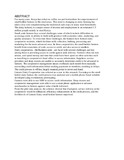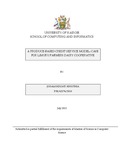| dc.description.abstract | For many years, Kenya has relied on coffee, tea and horticulture for empowerment of
small holder farmers in the rural areas. This trend is changing as dairy farming has
taken a key role complementing the traditional cash crops in many rural households.
The dairy industry is a major source of income and employment to an estimated 1.5
million people mainly in rural Kenya.
Small scale farmers face several challenges some of which include difficulties in
accessing credit, in-ability to build milk produce with economic value, marketing, and
quality assurance. To overcome these challenges, the farmers have formed dairy
cooperative societies, which facilitate milk collection, bulking, processing and
marketing for the more advanced ones. In these cooperatives, the small holder farmers
benefit from economies of scale, access to credit, and also access to markets.
Dairy cooperatives - the business units - are faced with several challenges and key
among those is providing access to credit against milk delivery. Farmers often run into
arrears, and spend money and time that could have been spent on other activities such
as travelling to cooperative's head office to access information. Suppliers, service
providers and shop owners are unable to accurately determine credit to be advanced to
farmers. The cooperative management incurs overheads each month from manually
reconciling credit information before making payments to members, resulting in delays.
The credit process is offline, largely manual, prone to errors and fraud.
Limuru Dairy Cooperative was selected as a case in this research. Focusing on the small
holder dairy farmer, the credit process was analyzed and a mobile phone based solution
developed using evolutionary prototyping.
Farmers were able to use SMS to access credit information. Shop owners and
cooperative management were able to use a smart phone application to advance
merchandise to farmers against value of milk delivered.
From the pilot data analysis, the solution showed that if adopted, service delivery at the
cooperative would be enhanced, efficiency enhancement in the credit process, and the
livelihoods of Limuru Dairy small holder farmers improved. | en |


